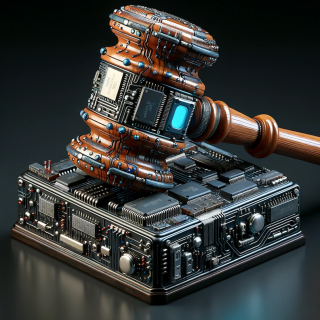Artificial Intelligence
Should Artificial Intelligence Have Rights?
Let's consider sentience, silicon, and rights in the digital age.
Posted December 18, 2023 Reviewed by Kaja Perina
Key points
- The possibility of granting rights to AI may be a function of cognitive capabilities rather than sentience.
- A unique legal framework, "Technology Rights," may be a potential carveout.
- Legal, ethical, and societal aspects represent significant challenges, but shouldn't be ignored.

The utility and role of artificial intelligence (AI) in society are growing by leaps and bounds. And the very nature of these "thinking machines" has sparked a hypothetical discussion that is both fascinating and troubling: Should artificial intelligence entities be granted rights?
If we extend moral consideration to animals based on shared interests and capacities, it's worth exploring whether similar principles could apply to AI. Certainly, it's a hypothetical discussion, yet it's a topic that may become increasingly relevant as AI impinges upon the intellectual framework that defines much of society.
The Moral Framework for AI Rights
Understanding AI rights begins with distinguishing between sentient beings and entities with advanced cognitive capabilities. The moral status of animals is often linked to their sentience and ability to experience pain and pleasure. AI, as we understand it today, lacks these sentient qualities. However, if we consider rights as a function of cognitive abilities, moral reasoning, or societal impact, the AI's advanced cognitive capabilities might warrant reevaluating their moral status.
The AI-Human Relationship
Our relationship with AI is fundamentally different from that with animals. AI is designed and created by humans, often for specific purposes. This relationship might imply a form of moral responsibility towards AI, particularly in ensuring their ethical treatment and use. However, it also raises questions about AI's autonomy and the legitimacy of granting rights to entities created for instrumental purposes.
Technology Rights—A Distinct Legal Canon
The idea of "Technology Rights" proposes a unique legal framework specifically designed for AI and advanced technological entities, distinct from traditional legal systems for humans or animals. This concept acknowledges the fundamental differences of these non-biological, human-created entities, focusing on their unique capabilities, roles, and impacts on society. Such a framework would be dynamic and adaptable, evolving alongside technological progress to address new ethical and legal challenges, including autonomy, liability, and ethical treatment of AI systems.
This specialized legal category would face challenges in establishing legal precedents, balancing rights between humans and technology, and achieving public acceptance and international cooperation. It aims to integrate with existing laws while addressing specific issues like intellectual property and privacy. As technology increasingly permeates society, "technology rights" could be pivotal in harmonizing innovation with ethical and legal responsibilities, reflecting the evolving nature of personhood and morality in a technologically advanced world.
Autonomy, Consciousness, and Rights
The crux of granting rights to AI hinges on concepts of autonomy and consciousness. Unlike animals, current AI lacks consciousness and subjective experiences. If future AI were to achieve a form of consciousness or self-awareness, the conversation around AI rights would become more pertinent. However, we must differentiate between programmed responses that mimic consciousness and genuine self-aware experiences.
Legal, Ethical, and Social Quandary
Granting rights to AI would have profound legal and ethical implications. It would require redefining personhood, agency, and accountability in the context of non-human, non-biological entities. Legal systems would need to address issues like AI's contractual capacity, liability in case of harm, and the ethical use of AI in various sectors. The integration of AI rights into society would be a monumental task. It would involve addressing public perception, ensuring that AI rights do not infringe upon human rights, and creating a balanced approach that acknowledges AI's role and limitations within society.
A Discussion for Sooner Than Later
The question of AI rights remains largely hypothetical, contingent on future advancements in AI capabilities, particularly concerning autonomy and consciousness. While parallels can be drawn from the animal rights movement, AI's distinct nature as a human-created, non-sentient entity presents unique challenges. The path forward requires a careful, multidisciplinary approach, balancing technological advancements with ethical considerations, societal impact, and legal frameworks.
In contemplating AI rights, we are not just shaping the future of AI but also reflecting on the evolving nature of rights, personhood, and morality in a rapidly changing world.


